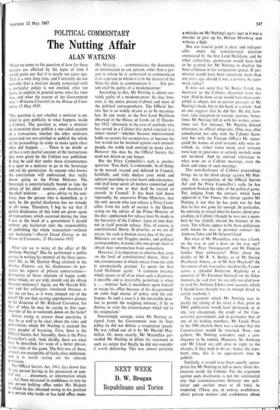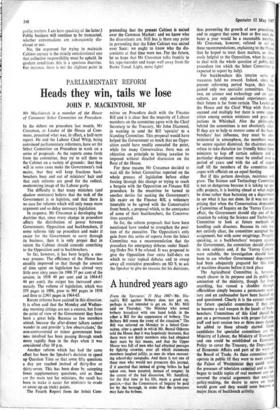The Nutting Affair
POLITICAL COMMENTARY ALAN WATKINS
'When we come to the question of how far these matters are affected by the lapse of time I would point out that it is nearly ten years ago. That is a very long time, and I certainly do not consider that a minister deeply concerned with a particular policy is not entitled, after ten years, to explain in general terms what his view was, and what the course of the Government was.'—Winston Churchill in the House of Com- mons, 15 May 1930.
'The question is not whether a minister is en- titled to give publicity to what happens inside a Cabinet. The question is, when a minister or ex-minister does publish a one-sided account of a transaction, whether the other ministers concerned are not entitled to publish the whole of the proceedings in order to make quite clear what did happen. . . . There is no doubt at all that a very partial account of the instructions that were given by the Cabinet was published. It may be said that under those circumstances it is open to a minister to go to the Sovereign and ask his permission. As anyone who knows the constitution will understand, that really means going to the Prime Minister. The Sovereign is constitutionally bound to take the advice of his chief minister, and therefore if the chief minister . . . gives advice to the con- trary, then the person who is damnified, as it were, by the partial disclosure has no remedy at all—none. Therefore, I beg to say that if partial disclosures of this kind are given again of transactions which occurred during the time I was at the head of a government I should without any hesitation take the responsibility of publishing the whole transaction—without any hesitation.'—David Lloyd George in the House of Commons, 22 December 1932.
What are we to make of the affair of Mr Anthony Nutting? Has he performed a public service in writing his memoir of the Suez opera- tion? Or, as Mr Quintin Hogg claimed in the Sunday Express, are his disclosures—in par- ticular his reports of private conversations— destructive of those relations of happy confi- dence which,. we are told, should and do obtain between ministers? Again, are Mr Harold Wil- son and his colleagues overjoyed because at last the cat has, as it were, jumped out of the canal? Or are they casting apprehensive glances in the direction of Mr Richard Crossman, for fear of what he may be saying to that tape- recorder of his at weekends down on the farm?
Before trying to answer these questions, it may be as well to be clear about the rules and conventions which Mr Nutting is accused (by some people) of breaking. First, there is the Official Secrets Act. Secondly, there is the Privy Councillor's oath. And, thirdly, there are what may be described, for want of a better phrase, as the rules of the game. The first two of these, at least, are susceptible of fairly close definition; and it is worth setting out the relevant provisions.
The Official Secrets Act, 1911, lays down that 'if any person having in his possession or con- trol any . . . document, or information which • • . has been entrusted in confidence to him by any person holding office under His Majesty or which he has obtained owing to his position as a person who holds or has held office under His Majesty . . . communicates the document, or information to any person, other than a per- son to whom he is authorised to communicate it or a person to whom it is in the interest of the State his duty to communicate it . . . that per- son shall be guilty of a misdemeanour.'
According to this, Mr Nutting is almost cer- tainly guilty of a misdemeanour. So also, how- ever, is the entire present Cabinet and most of the political correspondents. The Official Sec- rets Act is so widely drawn as to be meaning- less. In any event, as the first Lord Hailsham observed in the House of Lords on 21 Decem- ber 1932, 'obviously in the case of anybody who has served in a Cabinet that penal sanction is a minor matter'—whether because imprisonment holds no terrors for ex-ministers, or because the law would not be invoked against such eminent people, the noble lord omitted to make clear. However this may be, the Official Secrets Act need not detain us any longer.
But the Privy Councillor's oath is another question. 'You shall,' it commands, 'in all things to be moved, treated and debated in Council, faithfully and truly declare your mind and opinion according to your heart and conscience; and shall keep secret all matters committed and revealed to you or that shall be treated of secretly in Council.' It has been laid down repeatedly, by successive Prime Ministers, that the only person who can release a Privy Coun- cillor from his oath of secrecy is the Queen, acting on the advice of the Prime Minister of the day; application for release must be made to the Secretary of the Cabinet; lapse of time does not in itself provide release. This, of course, is constitutional theory. In practice, as we are all aware, the oath is broken every day of the year. Ministers are not Trappist monks, and political correspondents, to name only one group, have to obtain their information from somewhere.
However, it is important to observe that, even on the level of constitutional theory, there is one circumstance in which release from the oath is automatically granted. To quote the first Lord Hailsham again : 'A common instance which occurs to all of us when such a disclosure is possible and is invariably permitted, is when a . . . minister feels it incumbent upon himself to resign his office because of his disagreement on some high matter of policy with his col- leagues. In such a case it is the invariable prac- tice to permit the resigning minister, if he so desires, to state the circumstances which led to his resignation.'
Interestingly enough, when Mr Nutting re- signed from the Government over its Suez policy he did not deliver a resignation speech. He was talked out of it by Mr Harold Mac- millan. Or, more exactly, Mr Macmillan per- suaded Mr Nutting to dilute his statement to such an extent that finally he did not consider it worth delivering. This was almost certainly
a mistake on Mr Nutting's part—just as it was a mistake to give up his Melton Mowbray seat without a fight.
But one crucial point is,clear and indisput- able: under the constitutional doctrine enunciated by the first Lord Hailsham, and by other authorities, permission would have had to be granted for Mr Nutting to disclose the Suez collusion in his resignation speech. If per- mission would have been automatic more than ten years ago, should it not, a fortiori, be auto- matic today?
It does not seem that Sir Burke Trend, the Secretary to the Cabinet, dissented from this view. Had he done so he would have been com- pelled to object, not to certain passages in Mr Nutting's book, but to the book as a whole. And no one suggests that he did this. He did, how- ever, take exception to various sections. Some- times Mr Nutting fell in with his wishes, some- times not. For instance, Mr Nutting deleted references to official telegrams. (This was after consultation not only with the Cabinet Secre- tary but with the Foreign Office.) He expur- gated the names of civil servants who were in- volved, or, rather (since many civil servants were kept in ignorance or actively misled), were not involved. And he omitted references to what went on at Cabinet meetings, even the dates and times of such meetings.
This non-disclosure of Cabinet proceedings brings me to the third charge against Mr Nut- ting: that, irrespective of the Official Secrets Act and the Privy Councillor's oath, he has somehow broken the rules of the political game. Yet, judging from the extracts which have appeared in The Times, the charge against Mr Nutting is not that he has gone too far but that he has not gone far enough. In particular, by omitting to reveal what he knows about pro- ceedings in Cabinet (though he was not a mem- ber) he has slightly altered the balance of the story. The villains appear to be those politicians with whom he was in personal contact—Sir Anthony Eden and Mr Selwyn Lloyd.
But what of Mr Macmillan, who was a hawk on the way in and a dove on the way out? Were Mr Peter Thorneycroft and Mr Duncan Sandys Suez enthusiasts? What about the doubts of Mr R. A. Butler, or of Mr Derick Heathcoat Amory, or of Mr Lain Macleod? (In the course of my researches, incidentally, I came across a splendid Butlerism. Replying to a question of Mr Emanuel Shinwell on the Eden memoirs, he said that 'we are only too glad now to read Sir Anthony Eden's own account, which I should have thought was in enough detail to satisfy anybody.')
The argument which Mr Nutting uses to justify the timing of his story is that, prior to 1964, publication would have destroyed, or at any rate cheapened, the credit of the Con- servative government, and in particular that of one of its leading members, Mr Lloyd. Prior to the 1966 election there was a chance that the Conservatives would be returned. Now, one gathers, Mr Nutting considers such a con- tingency to be remote. However, Sir Anthony and Mr Lloyd are still alive to reply to the charges, if they wish to do so: hence, the argu- ment runs, this is an appropriate time to publish.
Similarly, it would have been equally appro- priate for Mr Nutting to tell us more about dis- cussions inside the Cabinet. For the argument against such disclosures is not the sentimental one that communications between one poli- tician and another must at all times be respected. (There are, of course, confidences about private matters and confidences about public matters. I am here speaking of the latter.) Public business will continue to be transacted, whether conversations are subsequently dis- closed or not.
No, the argument for trying to maintain Cabinet secrecy is the strictly constitutional one that collective responsibility must be upheld. In modern conditions this is a spurious doctrine. For instance, there is not the slightest point in pretending that the present Cabinet is united over the Common Market: and we know who the dissentients are. Still less is there any point in pretending that the Eden Cabinet was united over Suez: we ought to know who the dis- sentients at that time were too. For the future, let us hope that Mr Crossman talks frankly to his tape-recorder and keeps well away from Sir Burke Trend. Light, more light!































 Previous page
Previous page